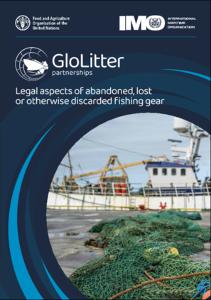| dc.contributor.author | Hodgson, Stephen | |
| dc.date.accessioned | 2022-11-10T21:17:13Z | |
| dc.date.available | 2022-11-10T21:17:13Z | |
| dc.date.issued | 2022 | |
| dc.identifier.citation | Hodgson, S. (2022) Legal aspects of abandoned, lost or otherwise discarded fishing gear.
Rome, Italy, Food and Agriculture Organization of the United Nations (FAO) and International Maritime Organization, 64pp. DOI: https://doi.org/10.4060/cb8071en | en_US |
| dc.identifier.isbn | 978-92-5-135542-8 | |
| dc.identifier.uri | https://repository.oceanbestpractices.org/handle/11329/2088 | |
| dc.description.abstract | The growing quantity of plastic waste in the marine environment, including
abandoned, lost or otherwise discarded fishing gear (ALDFG), is a global
problem. A particular feature of ALDFG is the potential for some gears to continue
fishing for many months or even years after they have been left in the marine
environment. This study examines the legal responses to ALDFG in the context of
marine fisheries. Following a discussion on the nature of ALDFG and some of the
reasons why fishing gear is abandoned, lost, or otherwise discarded, the study
examines the international community’s response to the problem. One key finding
is that ALDFG is simultaneously a fishing problem, a maritime transport problem
(regarding vessel source pollution) and an environmental problem resulting in the
involvement of the Food and Agriculture Organization of the United Nations (FAO),
the International Maritime Organization (IMO), the United Nations Environment
Programme (UNEP) and the United Nations General Assembly (UNGA) in seeking
solutions. After an examination of potential legal approaches to the problem, the
study describes the basic legal and institutional arrangements in four case-study
jurisdictions that have adopted legal measures to address ALDFG: Australia, the
European Union and its Member States, Norway and the United States of America.
These case studies once again reveal a tripartite responsibility shared between
fisheries, maritime transport and environment agencies. The intersectoral nature
of ALDFG suggests the need for a collaborative and coordinated approach. While
not all of the case-study jurisdictions make use of each of the ten individual legal
measures identified, the analysis clearly shows that ALDFG is a problem that can
be addressed through a legal response at the national or regional level, including
through the use of extended producer responsibility schemes, various reporting
requirements and gear standards. The legal tools to address the problem of ALDFG
clearly exist; however, the extent to which some or all of these are necessary or
appropriate in a given context – whether at the national, regional or global level –
is ultimately not a legal question, but a political one. | en_US |
| dc.language.iso | en | en_US |
| dc.publisher | Food and Agriculture Organization of the United Nations (FAO) and International Maritime Organization | en_US |
| dc.rights | Attribution-NonCommercial-ShareAlike 4.0 International | * |
| dc.rights.uri | http://creativecommons.org/licenses/by-nc-sa/4.0/ | * |
| dc.subject.other | Fishing Gear | en_US |
| dc.subject.other | GloLitter Partnerships | en_US |
| dc.title | Legal aspects of abandoned, lost or otherwise discarded fishing gear. | en_US |
| dc.type | Report | en_US |
| dc.description.status | Published | en_US |
| dc.format.pages | 64pp. | en_US |
| dc.description.notes | This document is part of the GloLitter
Partnerships Phase I Knowledge Products
Series. The GloLitter Partnerships project
is implemented by the International
Maritime Organization (IMO) and the
Food and Agriculture Organization of the
United Nations (FAO). GloLitter assists
developing countries in reducing marine
plastic litter from the maritime transport
and fisheries sectors. | en_US |
| dc.description.refereed | Refereed | en_US |
| dc.publisher.place | Rome, Italy | en_US |
| dc.identifier.doi | https://doi.org/10.4060/cb8071en | |
| dc.subject.parameterDiscipline | Fisheries | en_US |
| dc.subject.parameterDiscipline | Human activity | en_US |
| dc.description.currentstatus | Current | en_US |
| dc.description.sdg | 14.1 | en_US |
| dc.description.maturitylevel | Mature | en_US |
| dc.description.adoption | Multi-organisational | en_US |
| dc.description.adoption | International | en_US |
| dc.description.methodologyType | Reports with methodological relevance | en_US |
| obps.resourceurl.publisher | https://www.fao.org/responsible-fishing/resources/detail/en/c/1469915/ | |
 Repository of community practices in Ocean Research, Applications and Data/Information Management
Repository of community practices in Ocean Research, Applications and Data/Information Management

